
Volume XIII, Issue XVI
Apollonius
By Bob Kirchman
Copyright © 2017, The Kirchman Studio, all rights reserved
Chapter 11: New Life, Old Lies
Sarah could not wait to tell Abiyah the blessed news! With the last colonists on Mars to stay, the little crew felt a rush of freedom! Though they certainly pitied the colonists in their authoritarian community, they were glad to be rid of the oppression of George Apollonius themselves. Sarah was practically giddy as she raided the galley for ice cream. Abiyah was coming off the bridge for mandatory rest and the young woman beckoned him to their quarters. “I have something to tell you!” She hoped he would be joyful as well… but she held her breath as the steely captain of the Great Northern wondered at her words. “You are a father!” She saw the light in his eyes. They laughed and cried together. Captain Ben-Gurion was speechless! The veteran space pilot floated through the next ten hours of ‘rest period.’ He returned to the bridge with such a lightness of step that the crew accused him of slowing the gravity ring! He smiled as his closest colleagues teased unmercifully. He light-heartedly ordered them to “Stow it!” and resumed his emotionless stance at the ship’s controls… monitoring the sensors and controls for the least little sign of trouble. He now had one more member of his ‘crew’ to keep safe, and Abiyah took that part of his job very seriously already!
He would not have relaxed even as much as he did had he been able to know what was transpiring on the planet’s surface. Assured that no more ‘visitors’ would crash his settlement, George Apollonius quietly motioned his two most trusted launch operators into a control room.
Last operator shift was over 30 minutes ago,” said #211. #097 nodded agreement. “Is the candle ready for the surprise?” Apollonius asked.
Ready and loaded”
Can I light her?”
Light away!” said George Apollonius.
Apollonius rubbed his hands together. Surely he was pleased with himself for having smuggled five Iranian nuclear devices aboard in spite of Alaska Republic’s tight security. He had been able to, with the help of #097 and #211, create some confusion during the loading of the final shuttles. The scanner crews scanned five containers twice as a result while five were brought aboard unscanned. One of the devices had been installed on what was meant to be a distress signal in the event there was an emergency at the colony and they were unable to raise Earth. It really wouldn’t do much good, but it would at least give them a final means of calling for help. Until there were multiple colonies, however, any help would be slow in coming. The rocket was not supposed to be able to reach Earth return trajectory, however. Whatever Apollonius and his two co-conspirators had in mind would happen close to Mars. He would show the world he had weapons… the man who had insisted that the Great Northern carry none. As most of the colonists set to work to tame the hostile planet, it was now clear that George Apollonius had bigger things in mind.
(to be continued)
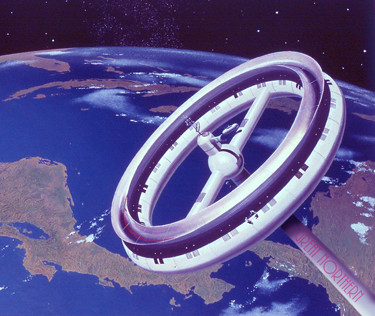
Around the World in 80 Days
By Jules Verne, Chapter XXIV
During which Mr. Fogg and Party Cross the Pacific Ocean
What happened when the pilot-boat came in sight of Shanghai will be easily guessed. The signals made by the Tankadere had been seen by the captain of the Yokohama steamer, who, espying the flag at half-mast, had directed his course towards the little craft. Phileas Fogg, after paying the stipulated price of his passage to John Busby, and rewarding that worthy with the additional sum of five hundred and fifty pounds, ascended the steamer with Aouda and Fix; and they started at once for Nagasaki and Yokohama.
They reached their destination on the morning of the 14th of November. Phileas Fogg lost no time in going on board the Carnatic, where he learned, to Aouda’s great delight — and perhaps to his own, though he betrayed no emotion — that Passepartout, a Frenchman, had really arrived on her the day before.
The San Francisco steamer was announced to leave that very evening, and it became necessary to find Passepartout, if possible, without delay. Mr. Fogg applied in vain to the French and English consuls, and, after wandering through the streets a long time, began to despair of finding his missing servant. Chance, or perhaps a kind of presentiment, at last led him into the Honourable Mr. Batulcar’s theatre. He certainly would not have recognised Passepartout in the eccentric mountebank’s costume; but the latter, lying on his back, perceived his master in the gallery. He could not help starting, which so changed the position of his nose as to bring the “pyramid” pell-mell upon the stage.
All this Passepartout learned from Aouda, who recounted to him what had taken place on the voyage from Hong Kong to Shanghai on the Tankadere, in company with one Mr. Fix.
Passepartout did not change countenance on hearing this name. He thought that the time had not yet arrived to divulge to his master what had taken place between the detective and himself; and, in the account he gave of his absence, he simply excused himself for having been overtaken by drunkenness, in smoking opium at a tavern in Hong Kong.
Mr. Fogg heard this narrative coldly, without a word; and then furnished his man with funds necessary to obtain clothing more in harmony with his position. Within an hour the Frenchman had cut off his nose and parted with his wings, and retained nothing about him which recalled the sectary of the god Tingou.
The steamer which was about to depart from Yokohama to San Francisco belonged to the Pacific Mail Steamship Company, and was named the General Grant. She was a large paddle-wheel steamer of two thousand five hundred tons; well equipped and very fast. The massive walking-beam rose and fell above the deck; at one end a piston-rod worked up and down; and at the other was a connecting-rod which, in changing the rectilinear motion to a circular one, was directly connected with the shaft of the paddles. The General Grant was rigged with three masts, giving a large capacity for sails, and thus materially aiding the steam power. By making twelve miles an hour, she would cross the ocean in twenty-one days. Phileas Fogg was therefore justified in hoping that he would reach San Francisco by the 2nd of December, New York by the 11th, and London on the 20th — thus gaining several hours on the fatal date of the 21st of December.
There was a full complement of passengers on board, among them English, many Americans, a large number of coolies on their way to California, and several East Indian officers, who were spending their vacation in making the tour of the world. Nothing of moment happened on the voyage; the steamer, sustained on its large paddles, rolled but little, and the Pacific almost justified its name. Mr. Fogg was as calm and taciturn as ever. His young companion felt herself more and more attached to him by other ties than gratitude; his silent but generous nature impressed her more than she thought; and it was almost unconsciously that she yielded to emotions which did not seem to have the least effect upon her protector. Aouda took the keenest interest in his plans, and became impatient at any incident which seemed likely to retard his journey.
She often chatted with Passepartout, who did not fail to perceive the state of the lady’s heart; and, being the most faithful of domestics, he never exhausted his eulogies of Phileas Fogg’s honesty, generosity, and devotion. He took pains to calm Aouda’s doubts of a successful termination of the journey, telling her that the most difficult part of it had passed, that now they were beyond the fantastic countries of Japan and China, and were fairly on their way to civilised places again. A railway train from San Francisco to New York, and a transatlantic steamer from New York to Liverpool, would doubtless bring them to the end of this impossible journey round the world within the period agreed upon.
On the ninth day after leaving Yokohama, Phileas Fogg had traversed exactly one half of the terrestrial globe. The General Grant passed, on the 23rd of November, the one hundred and eightieth meridian, and was at the very antipodes of London. Mr. Fogg had, it is true, exhausted fifty-two of the eighty days in which he was to complete the tour, and there were only twenty-eight left. But, though he was only half-way by the difference of meridians, he had really gone over two-thirds of the whole journey; for he had been obliged to make long circuits from London to Aden, from Aden to Bombay, from Calcutta to Singapore, and from Singapore to Yokohama. Could he have followed without deviation the fiftieth parallel, which is that of London, the whole distance would only have been about twelve thousand miles; whereas he would be forced, by the irregular methods of locomotion, to traverse twenty-six thousand, of which he had, on the 23rd of November, accomplished seventeen thousand five hundred. And now the course was a straight one, and Fix was no longer there to put obstacles in their way!
It happened also, on the 23rd of November, that Passepartout made a joyful discovery. It will be remembered that the obstinate fellow had insisted on keeping his famous family watch at London time, and on regarding that of the countries he had passed through as quite false and unreliable. Now, on this day, though he had not changed the hands, he found that his watch exactly agreed with the ship’s chronometers. His triumph was hilarious. He would have liked to know what Fix would say if he were aboard!
The rogue told me a lot of stories,” repeated Passepartout, “about the meridians, the sun, and the moon! Moon, indeed! moonshine more likely! If one listened to that sort of people, a pretty sort of time one would keep! I was sure that the sun would some day regulate itself by my watch!”
Passepartout was ignorant that, if the face of his watch had been divided into twenty-four hours, like the Italian clocks, he would have no reason for exultation; for the hands of his watch would then, instead of as now indicating nine o’clock in the morning, indicate nine o’clock in the evening, that is, the twenty-first hour after midnight precisely the difference between London time and that of the one hundred and eightieth meridian. But if Fix had been able to explain this purely physical effect, Passepartout would not have admitted, even if he had comprehended it. Moreover, if the detective had been on board at that moment, Passepartout would have joined issue with him on a quite different subject, and in an entirely different manner.
Where was Fix at that moment?
He was actually on board the General Grant.
On reaching Yokohama, the detective, leaving Mr. Fogg, whom he expected to meet again during the day, had repaired at once to the English consulate, where he at last found the warrant of arrest. It had followed him from Bombay, and had come by the Carnatic, on which steamer he himself was supposed to be. Fix’s disappointment may be imagined when he reflected that the warrant was now useless. Mr. Fogg had left English ground, and it was now necessary to procure his extradition!
Well,” thought Fix, after a moment of anger, “my warrant is not good here, but it will be in England. The rogue evidently intends to return to his own country, thinking he has thrown the police off his track. Good! I will follow him across the Atlantic. As for the money, heaven grant there may be some left! But the fellow has already spent in travelling, rewards, trials, bail, elephants, and all sorts of charges, more than five thousand pounds. Yet, after all, the Bank is rich!”
His course decided on, he went on board the General Grant, and was there when Mr. Fogg and Aouda arrived. To his utter amazement, he recognised Passepartout, despite his theatrical disguise. He quickly concealed himself in his cabin, to avoid an awkward explanation, and hoped — thanks to the number of passengers — to remain unperceived by Mr. Fogg’s servant.
On that very day, however, he met Passepartout face to face on the forward deck. The latter, without a word, made a rush for him, grasped him by the throat, and, much to the amusement of a group of Americans, who immediately began to bet on him, administered to the detective a perfect volley of blows, which proved the great superiority of French over English pugilistic skill.
When Passepartout had finished, he found himself relieved and comforted. Fix got up in a somewhat rumpled condition, and, looking at his adversary, coldly said, “Have you done?”
For this time — yes.”
Then let me have a word with you.”
But I—”
In your master’s interests.”
Passepartout seemed to be vanquished by Fix’s coolness, for he quietly followed him, and they sat down aside from the rest of the passengers.
You have given me a thrashing,” said Fix. “Good, I expected it. Now, listen to me. Up to this time I have been Mr. Fogg’s adversary. I am now in his game.”
Aha!” cried Passepartout; “you are convinced he is an honest man?”
No,” replied Fix coldly, “I think him a rascal. Sh! don’t budge, and let me speak. As long as Mr. Fogg was on English ground, it was for my interest to detain him there until my warrant of arrest arrived. I did everything I could to keep him back. I sent the Bombay priests after him, I got you intoxicated at Hong Kong, I separated you from him, and I made him miss the Yokohama steamer.”
Passepartout listened, with closed fists.
Now,” resumed Fix, “Mr. Fogg seems to be going back to England. Well, I will follow him there. But hereafter I will do as much to keep obstacles out of his way as I have done up to this time to put them in his path. I’ve changed my game, you see, and simply because it was for my interest to change it. Your interest is the same as mine; for it is only in England that you will ascertain whether you are in the service of a criminal or an honest man.”
Passepartout listened very attentively to Fix, and was convinced that he spoke with entire good faith.
Are we friends?” asked the detective.
Friends? — no,” replied Passepartout; “but allies, perhaps. At the least sign of treason, however, I’ll twist your neck for you.”
Agreed,” said the detective quietly.
Eleven days later, on the 3rd of December, the General Grant entered the bay of the Golden Gate, and reached San Francisco.
Mr. Fogg had neither gained nor lost a single day.
(to be continued)
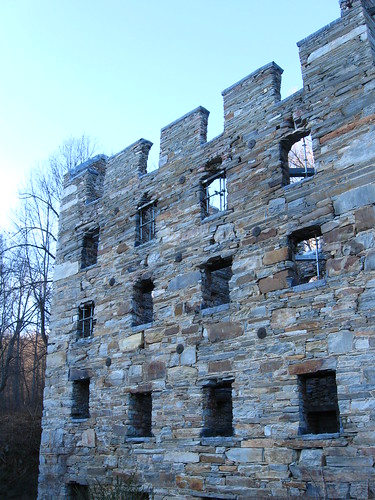
Beverley Mill, also known as Chapman Mill, is a historic grist mill located near Broad Run, Virginia.
Photo by Bob Kirchman.
Around the World in 80 Days
By Jules Verne, Chapter XXV
In which a Slight Glimpse is had of San Francisco
It was seven in the morning when Mr. Fogg, Aouda, and Passepartout set foot upon the American continent, if this name can be given to the floating quay upon which they disembarked. These quays, rising and falling with the tide, thus facilitate the loading and unloading of vessels. Alongside them were clippers of all sizes, steamers of all nationalities, and the steamboats, with several decks rising one above the other, which ply on the Sacramento and its tributaries. There were also heaped up the products of a commerce which extends to Mexico, Chili, Peru, Brazil, Europe, Asia, and all the Pacific islands.
Passepartout, in his joy on reaching at last the American continent, thought he would manifest it by executing a perilous vault in fine style; but, tumbling upon some worm-eaten planks, he fell through them. Put out of countenance by the manner in which he thus “set foot” upon the New World, he uttered a loud cry, which so frightened the innumerable cormorants and pelicans that are always perched upon these movable quays, that they flew noisily away.
Mr. Fogg, on reaching shore, proceeded to find out at what hour the first train left for New York, and learned that this was at six o’clock p.m.; he had, therefore, an entire day to spend in the Californian capital. Taking a carriage at a charge of three dollars, he and Aouda entered it, while Passepartout mounted the box beside the driver, and they set out for the International Hotel.
From his exalted position Passepartout observed with much curiosity the wide streets, the low, evenly ranged houses, the Anglo-Saxon Gothic churches, the great docks, the palatial wooden and brick warehouses, the numerous conveyances, omnibuses, horse-cars, and upon the side-walks, not only Americans and Europeans, but Chinese and Indians. Passepartout was surprised at all he saw. San Francisco was no longer the legendary city of 1849 — a city of banditti, assassins, and incendiaries, who had flocked hither in crowds in pursuit of plunder; a paradise of outlaws, where they gambled with gold-dust, a revolver in one hand and a bowie-knife in the other: it was now a great commercial emporium.
The lofty tower of its City Hall overlooked the whole panorama of the streets and avenues, which cut each other at right-angles, and in the midst of which appeared pleasant, verdant squares, while beyond appeared the Chinese quarter, seemingly imported from the Celestial Empire in a toy-box. Sombreros and red shirts and plumed Indians were rarely to be seen; but there were silk hats and black coats everywhere worn by a multitude of nervously active, gentlemanly-looking men. Some of the streets — especially Montgomery Street, which is to San Francisco what Regent Street is to London, the Boulevard des Italiens to Paris, and Broadway to New York — were lined with splendid and spacious stores, which exposed in their windows the products of the entire world.
When Passepartout reached the International Hotel, it did not seem to him as if he had left England at all.
The ground floor of the hotel was occupied by a large bar, a sort of restaurant freely open to all passers-by, who might partake of dried beef, oyster soup, biscuits, and cheese, without taking out their purses. Payment was made only for the ale, porter, or sherry which was drunk. This seemed “very American” to Passepartout. The hotel refreshment-rooms were comfortable, and Mr. Fogg and Aouda, installing themselves at a table, were abundantly served on diminutive plates by negroes of darkest hue.
After breakfast, Mr. Fogg, accompanied by Aouda, started for the English consulate to have his passport visaed. As he was going out, he met Passepartout, who asked him if it would not be well, before taking the train, to purchase some dozens of Enfield rifles and Colt’s revolvers. He had been listening to stories of attacks upon the trains by the Sioux and Pawnees. Mr. Fogg thought it a useless precaution, but told him to do as he thought best, and went on to the consulate.
He had not proceeded two hundred steps, however, when, “by the greatest chance in the world,” he met Fix. The detective seemed wholly taken by surprise. What! Had Mr. Fogg and himself crossed the Pacific together, and not met on the steamer! At least Fix felt honoured to behold once more the gentleman to whom he owed so much, and, as his business recalled him to Europe, he should be delighted to continue the journey in such pleasant company.
Mr. Fogg replied that the honour would be his; and the detective — who was determined not to lose sight of him — begged permission to accompany them in their walk about San Francisco — a request which Mr. Fogg readily granted.
They soon found themselves in Montgomery Street, where a great crowd was collected; the side-walks, street, horsecar rails, the shop-doors, the windows of the houses, and even the roofs, were full of people. Men were going about carrying large posters, and flags and streamers were floating in the wind; while loud cries were heard on every hand.
Hurrah for Camerfield!”
Hurrah for Mandiboy!”
It was a political meeting; at least so Fix conjectured, who said to Mr. Fogg, “Perhaps we had better not mingle with the crowd. There may be danger in it.”
Yes,” returned Mr. Fogg; “and blows, even if they are political are still blows.”
Fix smiled at this remark; and, in order to be able to see without being jostled about, the party took up a position on the top of a flight of steps situated at the upper end of Montgomery Street. Opposite them, on the other side of the street, between a coal wharf and a petroleum warehouse, a large platform had been erected in the open air, towards which the current of the crowd seemed to be directed.
For what purpose was this meeting? What was the occasion of this excited assemblage? Phileas Fogg could not imagine. Was it to nominate some high official — a governor or member of Congress? It was not improbable, so agitated was the multitude before them.
Just at this moment there was an unusual stir in the human mass. All the hands were raised in the air. Some, tightly closed, seemed to disappear suddenly in the midst of the cries — an energetic way, no doubt, of casting a vote. The crowd swayed back, the banners and flags wavered, disappeared an instant, then reappeared in tatters. The undulations of the human surge reached the steps, while all the heads floundered on the surface like a sea agitated by a squall. Many of the black hats disappeared, and the greater part of the crowd seemed to have diminished in height.
It is evidently a meeting,” said Fix, “and its object must be an exciting one. I should not wonder if it were about the Alabama, despite the fact that that question is settled.”
Perhaps,” replied Mr. Fogg, simply.
At least, there are two champions in presence of each other, the Honourable Mr. Camerfield and the Honourable Mr. Mandiboy.”
Aouda, leaning upon Mr. Fogg’s arm, observed the tumultuous scene with surprise, while Fix asked a man near him what the cause of it all was. Before the man could reply, a fresh agitation arose; hurrahs and excited shouts were heard; the staffs of the banners began to be used as offensive weapons; and fists flew about in every direction. Thumps were exchanged from the tops of the carriages and omnibuses which had been blocked up in the crowd. Boots and shoes went whirling through the air, and Mr. Fogg thought he even heard the crack of revolvers mingling in the din, the rout approached the stairway, and flowed over the lower step. One of the parties had evidently been repulsed; but the mere lookers-on could not tell whether Mandiboy or Camerfield had gained the upper hand.
It would be prudent for us to retire,” said Fix, who was anxious that Mr. Fogg should not receive any injury, at least until they got back to London. “If there is any question about England in all this, and we were recognised, I fear it would go hard with us.”
An English subject —” began Mr. Fogg.
He did not finish his sentence; for a terrific hubbub now arose on the terrace behind the flight of steps where they stood, and there were frantic shouts of, “Hurrah for Mandiboy! Hip, hip, hurrah!”
It was a band of voters coming to the rescue of their allies, and taking the Camerfield forces in flank. Mr. Fogg, Aouda, and Fix found themselves between two fires; it was too late to escape. The torrent of men, armed with loaded canes and sticks, was irresistible. Phileas Fogg and Fix were roughly hustled in their attempts to protect their fair companion; the former, as cool as ever, tried to defend himself with the weapons which nature has placed at the end of every Englishman’s arm, but in vain. A big brawny fellow with a red beard, flushed face, and broad shoulders, who seemed to be the chief of the band, raised his clenched fist to strike Mr. Fogg, whom he would have given a crushing blow, had not Fix rushed in and received it in his stead. An enormous bruise immediately made its appearance under the detective’s silk hat, which was completely smashed in.
Yankee!” exclaimed Mr. Fogg, darting a contemptuous look at the ruffian.
Englishman!” returned the other. “We will meet again!”
When you please.”
What is your name?”
Phileas Fogg. And yours?”
Colonel Stamp Proctor.”
The human tide now swept by, after overturning Fix, who speedily got upon his feet again, though with tattered clothes. Happily, he was not seriously hurt. His travelling overcoat was divided into two unequal parts, and his trousers resembled those of certain Indians, which fit less compactly than they are easy to put on. Aouda had escaped unharmed, and Fix alone bore marks of the fray in his black and blue bruise.
Thanks,” said Mr. Fogg to the detective, as soon as they were out of the crowd.
No thanks are necessary,” replied. Fix; “but let us go.”
Where?”
To a tailor’s.”
Such a visit was, indeed, opportune. The clothing of both Mr. Fogg and Fix was in rags, as if they had themselves been actively engaged in the contest between Camerfield and Mandiboy. An hour after, they were once more suitably attired, and with Aouda returned to the International Hotel.
Passepartout was waiting for his master, armed with half a dozen six-barrelled revolvers. When he perceived Fix, he knit his brows; but Aouda having, in a few words, told him of their adventure, his countenance resumed its placid expression. Fix evidently was no longer an enemy, but an ally; he was faithfully keeping his word.
Dinner over, the coach which was to convey the passengers and their luggage to the station drew up to the door. As he was getting in, Mr. Fogg said to Fix, “You have not seen this Colonel Proctor again?”
No.”
I will come back to America to find him,” said Phileas Fogg calmly. “It would not be right for an Englishman to permit himself to be treated in that way, without retaliating.”
The detective smiled, but did not reply. It was clear that Mr. Fogg was one of those Englishmen who, while they do not tolerate duelling at home, fight abroad when their honour is attacked.
At a quarter before six the travellers reached the station, and found the train ready to depart. As he was about to enter it, Mr. Fogg called a porter, and said to him: “My friend, was there not some trouble to-day in San Francisco?”
It was a political meeting, sir,” replied the porter.
But I thought there was a great deal of disturbance in the streets.”
It was only a meeting assembled for an election.”
The election of a general-in-chief, no doubt?” asked Mr. Fogg.
No, sir; of a justice of the peace.”
Phileas Fogg got into the train, which started off at full speed.
(to be continued)
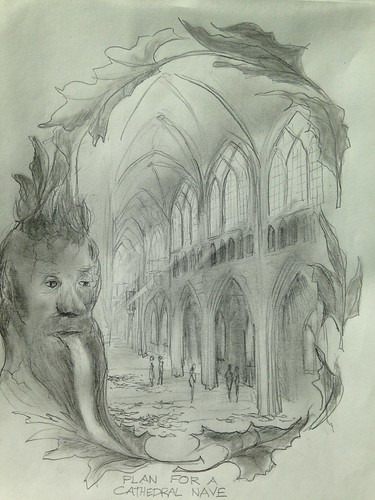
Homage to the Inklings. Sketch by Bob Kirchman.
Around the World in 80 Days
By Jules Verne, Chapter XXVI
In which Phileas Fogg and Party Travel by the Pacific Railroad
From ocean to ocean”— so say the Americans; and these four words compose the general designation of the “great trunk line” which crosses the entire width of the United States. The Pacific Railroad is, however, really divided into two distinct lines: the Central Pacific, between San Francisco and Ogden, and the Union Pacific, between Ogden and Omaha. Five main lines connect Omaha with New York.
New York and San Francisco are thus united by an uninterrupted metal ribbon, which measures no less than three thousand seven hundred and eighty-six miles. Between Omaha and the Pacific the railway crosses a territory which is still infested by Indians and wild beasts, and a large tract which the Mormons, after they were driven from Illinois in 1845, began to colonise.
The journey from New York to San Francisco consumed, formerly, under the most favourable conditions, at least six months. It is now accomplished in seven days.
It was in 1862 that, in spite of the Southern Members of Congress, who wished a more southerly route, it was decided to lay the road between the forty-first and forty-second parallels. President Lincoln himself fixed the end of the line at Omaha, in Nebraska. The work was at once commenced, and pursued with true American energy; nor did the rapidity with which it went on injuriously affect its good execution. The road grew, on the prairies, a mile and a half a day. A locomotive, running on the rails laid down the evening before, brought the rails to be laid on the morrow, and advanced upon them as fast as they were put in position.
The Pacific Railroad is joined by several branches in Iowa, Kansas, Colorado, and Oregon. On leaving Omaha, it passes along the left bank of the Platte River as far as the junction of its northern branch, follows its southern branch, crosses the Laramie territory and the Wahsatch Mountains, turns the Great Salt Lake, and reaches Salt Lake City, the Mormon capital, plunges into the Tuilla Valley, across the American Desert, Cedar and Humboldt Mountains, the Sierra Nevada, and descends, via Sacramento, to the Pacific — its grade, even on the Rocky Mountains, never exceeding one hundred and twelve feet to the mile.
Such was the road to be traversed in seven days, which would enable Phileas Fogg — at least, so he hoped — to take the Atlantic steamer at New York on the 11th for Liverpool.
The car which he occupied was a sort of long omnibus on eight wheels, and with no compartments in the interior. It was supplied with two rows of seats, perpendicular to the direction of the train on either side of an aisle which conducted to the front and rear platforms. These platforms were found throughout the train, and the passengers were able to pass from one end of the train to the other. It was supplied with saloon cars, balcony cars, restaurants, and smoking-cars; theatre cars alone were wanting, and they will have these some day.
Book and news dealers, sellers of edibles, drinkables, and cigars, who seemed to have plenty of customers, were continually circulating in the aisles.
The train left Oakland station at six o’clock. It was already night, cold and cheerless, the heavens being overcast with clouds which seemed to threaten snow. The train did not proceed rapidly; counting the stoppages, it did not run more than twenty miles an hour, which was a sufficient speed, however, to enable it to reach Omaha within its designated time.
There was but little conversation in the car, and soon many of the passengers were overcome with sleep. Passepartout found himself beside the detective; but he did not talk to him. After recent events, their relations with each other had grown somewhat cold; there could no longer be mutual sympathy or intimacy between them. Fix’s manner had not changed; but Passepartout was very reserved, and ready to strangle his former friend on the slightest provocation.
Snow began to fall an hour after they started, a fine snow, however, which happily could not obstruct the train; nothing could be seen from the windows but a vast, white sheet, against which the smoke of the locomotive had a greyish aspect.
At eight o’clock a steward entered the car and announced that the time for going to bed had arrived; and in a few minutes the car was transformed into a dormitory. The backs of the seats were thrown back, bedsteads carefully packed were rolled out by an ingenious system, berths were suddenly improvised, and each traveller had soon at his disposition a comfortable bed, protected from curious eyes by thick curtains. The sheets were clean and the pillows soft. It only remained to go to bed and sleep which everybody did — while the train sped on across the State of California.
The country between San Francisco and Sacramento is not very hilly. The Central Pacific, taking Sacramento for its starting-point, extends eastward to meet the road from Omaha. The line from San Francisco to Sacramento runs in a north-easterly direction, along the American River, which empties into San Pablo Bay. The one hundred and twenty miles between these cities were accomplished in six hours, and towards midnight, while fast asleep, the travellers passed through Sacramento; so that they saw nothing of that important place, the seat of the State government, with its fine quays, its broad streets, its noble hotels, squares, and churches.
The train, on leaving Sacramento, and passing the junction, Roclin, Auburn, and Colfax, entered the range of the Sierra Nevada. ‘Cisco was reached at seven in the morning; and an hour later the dormitory was transformed into an ordinary car, and the travellers could observe the picturesque beauties of the mountain region through which they were steaming. The railway track wound in and out among the passes, now approaching the mountain-sides, now suspended over precipices, avoiding abrupt angles by bold curves, plunging into narrow defiles, which seemed to have no outlet. The locomotive, its great funnel emitting a weird light, with its sharp bell, and its cow-catcher extended like a spur, mingled its shrieks and bellowings with the noise of torrents and cascades, and twined its smoke among the branches of the gigantic pines.
There were few or no bridges or tunnels on the route. The railway turned around the sides of the mountains, and did not attempt to violate nature by taking the shortest cut from one point to another.
The train entered the State of Nevada through the Carson Valley about nine o’clock, going always northeasterly; and at midday reached Reno, where there was a delay of twenty minutes for breakfast.
From this point the road, running along Humboldt River, passed northward for several miles by its banks; then it turned eastward, and kept by the river until it reached the Humboldt Range, nearly at the extreme eastern limit of Nevada.
Having breakfasted, Mr. Fogg and his companions resumed their places in the car, and observed the varied landscape which unfolded itself as they passed along the vast prairies, the mountains lining the horizon, and the creeks, with their frothy, foaming streams. Sometimes a great herd of buffaloes, massing together in the distance, seemed like a moveable dam. These innumerable multitudes of ruminating beasts often form an insurmountable obstacle to the passage of the trains; thousands of them have been seen passing over the track for hours together, in compact ranks. The locomotive is then forced to stop and wait till the road is once more clear.
This happened, indeed, to the train in which Mr. Fogg was travelling. About twelve o’clock a troop of ten or twelve thousand head of buffalo encumbered the track. The locomotive, slackening its speed, tried to clear the way with its cow-catcher; but the mass of animals was too great. The buffaloes marched along with a tranquil gait, uttering now and then deafening bellowings. There was no use of interrupting them, for, having taken a particular direction, nothing can moderate and change their course; it is a torrent of living flesh which no dam could contain.
The travellers gazed on this curious spectacle from the platforms; but Phileas Fogg, who had the most reason of all to be in a hurry, remained in his seat, and waited philosophically until it should please the buffaloes to get out of the way.
Passepartout was furious at the delay they occasioned, and longed to discharge his arsenal of revolvers upon them.
What a country!” cried he. “Mere cattle stop the trains, and go by in a procession, just as if they were not impeding travel! Parbleu! I should like to know if Mr. Fogg foresaw this mishap in his programme! And here’s an engineer who doesn’t dare to run the locomotive into this herd of beasts!”
The engineer did not try to overcome the obstacle, and he was wise. He would have crushed the first buffaloes, no doubt, with the cow-catcher; but the locomotive, however powerful, would soon have been checked, the train would inevitably have been thrown off the track, and would then have been helpless.
The best course was to wait patiently, and regain the lost time by greater speed when the obstacle was removed. The procession of buffaloes lasted three full hours, and it was night before the track was clear. The last ranks of the herd were now passing over the rails, while the first had already disappeared below the southern horizon.
It was eight o’clock when the train passed through the defiles of the Humboldt Range, and half-past nine when it penetrated Utah, the region of the Great Salt Lake, the singular colony of the Mormons.
(to be continued)
'No Fishin''
Painting by Kristina Elaine Greer
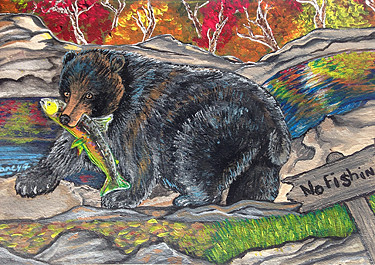
This painting reminds me of a wonderful hike up Jeremy's Run in Shenandoah National Park. I saw a large solitary bear (probably male) in the stream. Further up stream I saw a mother with two cubs. The cubs were play boxing with each other.
'The Apprentice'
Benjamin Banneker's Amazing Accomplishments
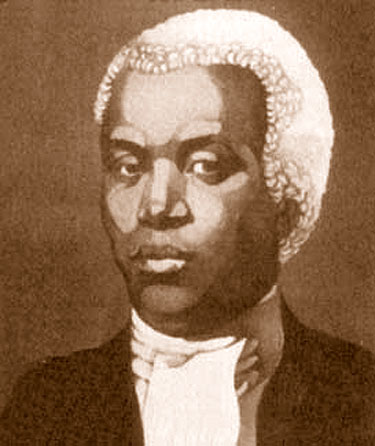
Benjamin Banneker was a renaissance man.
"You're Fired"
A Milestone Monday Feature:
The story of Benjamin Banneker is forever intertwined with the planning of our nation's capital city. In 1791 Banneker was in the employment of Andrew Ellicott, who was charged with the task of laying out the monumental city plan concieved by French architect Pierre Charles de L'Enfant, who had been hired to design a capital suitable for the new republic.
L'Enfant based his design on the best traditions of Baroque landscape design and his creation resembled the hunting gardens of Louis XIV's massive palace at Versailles. L'Enfant proved to be very difficult to work with... America's first 'rock star' architect, you might say. George Washington fired him.
Here the traditional story says that L'Enfant rolled up his drawings and left the young country in a huff, taking his designs with him. Ellicott turned to Banneker, who had prepared the actual surveys, and Banneker is said to have redrawn the plans from memory!
Though many modern historians doubt that Banneker recreated the plans from memory, the man's documented accomplishments would be in keeping with those of a man capable of such a feat.
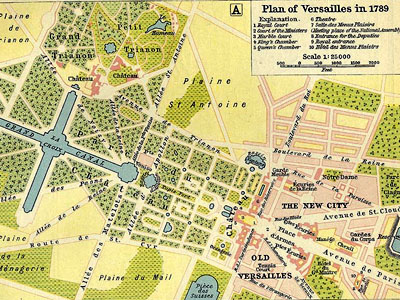
The hunting gardens of Versailles...
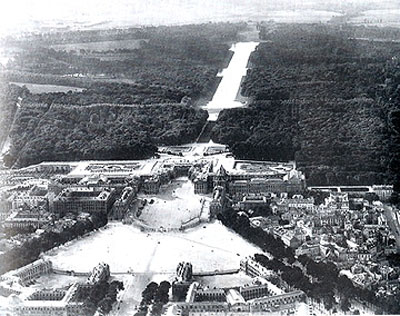
...inspiration for our nation's capital?
A simple farmer most of his life, Banneker had the good fortune to know the Quaker settlers of Ellicott's Mills in Maryland. The Society of Friends believed in providing basic education to all people and young Banneker certainly received a solid basic education.
Banneker became a student of astronomy and published an almanac. He corresponded with President Thomas Jefferson on the issue of the status of his fellow African Americans. His letter to Jefferson is well crafted, invoking reason as well as compassion. It appears that Banneker took up the craft of surveying in his fifties, looking to a time when he might be physically too old to farm.
Banneker is said to have observed the workings of a clock and then carved his own working clock mechanism from scrap wood. He published his almanac until 1802.
Banneker lived for four years after his almanacs discontinued. He published a treatise on bees, did a mathematical study on the cycle of the seventeen-year locust, and became a pamphleteer for the anti-slavery movement. He continued scientific studies by night and walked his land by day. He also continued to keep his garden. He hosted many distinguished scientists and artists of his day, and his visitors commented on his intelligence and on his knowledge of everything of importance that was happening in the country. As always, he remained precise and reflective in his conversations with others. His last walk (with a friend) came on October 9, 1806, he complained of being ill and went home to rest on his couch. He died later that day." [1.]
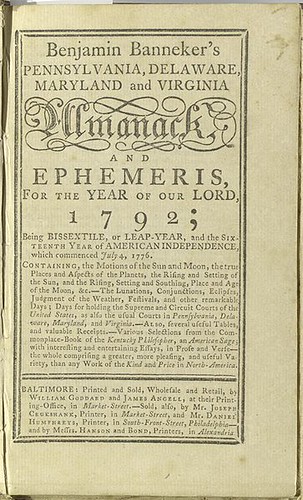
Banneker's Almanac.
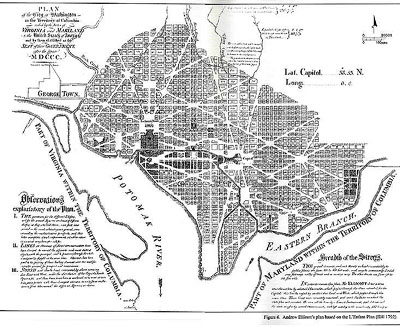
The Ellicott/Banneker map of Washington.
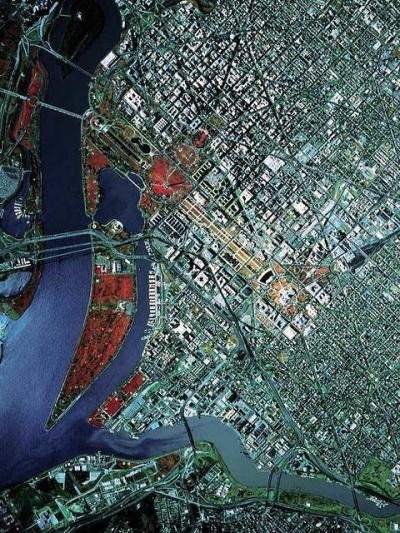
The city today.
1791 Letter to Jefferson
To Thomas Jefferson from Benjamin Banneker,
19 August 1791
From Benjamin Banneker
Maryland. Baltimore County. Near Ellicotts Lower Mills
August 19th: 1791
SIR
I am fully sensible of the greatness of that freedom which I take with you on the present occasion; a liberty which Seemed to me scarcely allowable, when I reflected on that distinguished, and dignifyed station in which you Stand; and the almost general prejudice and prepossession which is so prevailent in the world against those of my complexion. I suppose it is a truth too well attested to you, to need a proof here, that we are a race of Beings who have long laboured under the abuse and censure of the world, that we have long been looked upon with an eye of contempt, and1 that we have long been considered rather as brutish than human, and Scarcely capable of mental endowments.
Sir I hope I may Safely admit, in consequence of that report which hath reached me, that you are a man far less inflexible in Sentiments of this nature, than many others, that you are measurably friendly and well disposed toward us, and that you are willing and ready to Lend your aid and assistance to our relief from those many distresses and numerous calamities to which we are reduced.
Now Sir if this is founded in truth, I apprehend you will readily embrace every opportunity to eradicate that train of absurd and false ideas and oppinions which so generally prevails with respect to us, and that your Sentiments are concurrent with mine, which are that one universal Father hath given being to us all, and that he hath not only made us all of one flesh, but that he hath also without partiality afforded us all the Same Sensations, and endued us all with the same faculties, and that however variable we may be in Society or religion, however diversifyed in Situation or colour, we are all of the Same Family, and Stand in the Same relation to him.
Sir, if these are Sentiments of which you are fully persuaded, I hope you cannot but acknowledge, that it is the indispensible duty of those who maintain for themselves the rights of human nature, and who profess the obligations of Christianity, to extend their power and influence to the relief of every part of the human race, from whatever burthen or oppression they may unjustly labour under, and this I apprehend a full conviction of the truth and obligation of these principles should lead all to. Sir, I have long been convinced, that if your love for your Selves, and for those inesteemable laws which preserve to you the rights of human nature, was founded on Sincerity, you could not but be Solicitous, that every Individual of whatsoever rank or distinction, might with you equally enjoy the blessings thereof, neither could you rest Satisfyed, short of the most active diffusion of your exertions, in order to their promotion from any State of degradation, to which the unjustifyable cruelty and barbarism of men may have reduced them.
Sir I freely and Chearfully acknowledge, that I am of the African race, and in that colour which is natural to them of the deepest dye, and it is under a Sense of the most profound gratitude to the Supreme Ruler of the universe, that I now confess to you, that I am not under that State of tyrannical thraldom, and inhuman captivity, to which too many of my brethren are doomed; but that I have abundantly tasted of the fruition of those blessings which proceed from that free and unequalled liberty with which you are favoured and which I hope you will willingly allow you have received from the immediate hand of that Being, from whom proceedeth every good and perfect gift.
Sir, Suffer me to recall to your mind that time in which the Arms and tyranny of the British Crown were exerted with every powerful effort in order to reduce you to a State of Servitude, look back I intreat you on the variety of dangers to which you were exposed, reflect on that time in which every human aid appeared unavailable, and in which even hope and fortitude wore the aspect of inability to the Conflict, and you cannot but be led to a Serious and grateful Sense of your miraculous and providential preservation; you cannot but acknowledge, that the present freedom and tranquility which you enjoy you have mercifully received, and that it is the peculiar blessing of Heaven. This Sir, was a time in which you clearly saw into the injustice of a State of Slavery, and in which you had just apprehensions of the horrors of its condition, it was now Sir, that your abhorrence thereof was so excited, that you publickly held forth this true and invaluable doctrine, which is worthy to be recorded and remember’d in all Succeeding ages. “We hold these truths to be Self evident, that all men are created equal, and that they are endowed by their creator with certain unalienable rights, that among these are life, liberty, and the pursuit of happyness.”
Here Sir, was a time in which your tender feelings for your selves had engaged you thus to declare, you were then impressed with proper ideas of the great valuation of liberty, and the free possession of those blessings to which you were entitled by nature; but Sir how pitiable is it to reflect, that altho you were so fully convinced of the benevolence of the Father of mankind, and of his equal and impartial distribution of those rights and privileges which he had conferred upon them, that you should at the Same time counteract his mercies, in detaining by fraud and violence so numerous a part of my brethren under groaning captivity and cruel oppression, that you should at the Same time be found guilty of that most criminal act, which you professedly detested in others, with respect to yourselves.
Sir, I suppose that your knowledge of the situation of my brethren is too extensive to need a recital here; neither shall I presume to prescribe methods by which they may be relieved; otherwise than by recommending to you and all others, to wean yourselves from these narrow prejudices which you have imbibed with respect to them, and as Job proposed to his friends “Put your Souls in their Souls stead,” thus shall your hearts be enlarged with kindness and benevolence toward them, and thus shall you need neither the direction of myself or others in what manner to proceed herein.
And now, Sir, altho my Sympathy and affection for my brethren hath caused my enlargement thus far, I ardently hope that your candour and generosity will plead with you in my behalf, when I make known to you, that it was not originally my design; but that having taken up my pen in order to direct to you as a present, a copy of an Almanack which I have calculated for the Succeeding year, I was unexpectedly and unavoidably led thereto. This calculation, Sir, is the production of my arduous Study in this my advanced Stage of life; for having long had unbounded desires to become acquainted with the Secrets of nature, I have had to gratify my curiosity herein thro my own assiduous application to Astronomical Study, in which I need not to recount to you the many difficulties and disadvantages which I have had to encounter.
And altho I had almost declined to make my calculation for the ensuing year, in consequence of that time which I had allotted therefor being taking up at the Federal Territory by the request of Mr. Andrew Ellicott, yet finding myself under Several engagements to printers of this state to whom I had communicated my design, on my return to my place of residence, I industriously apply’d myself thereto, which I hope I have accomplished with correctness and accuracy, a copy of which I have taken the liberty to direct to you, and which I humbly request you will favourably receive, and altho you may have the opportunity of perusing it after its publication, yet I chose to send it to you in manuscript previous thereto, that thereby you might not only have an earlier inspection, but that you might also view it in my own hand writing.—And now Sir, I shall conclude and Subscribe my Self with the most profound respect your most Obedient humble Servant,
BENJAMIN BANNEKER
NB any communication to me may be had by a direction to Mr. Elias Ellicott merchant in Baltimore Town.
B B
As an Essay of my calculation is put into the hand of Mr. Cruckshank of philadelphia, for publication I would wish that you might neither have this Almanack copy published nor give any printer an opportunity thereof, as it might tend to disappoint Mr. Joseph Cruckshank in his sale. [2.]
It's Fall Y'all
Painting by Savhanna Herndon
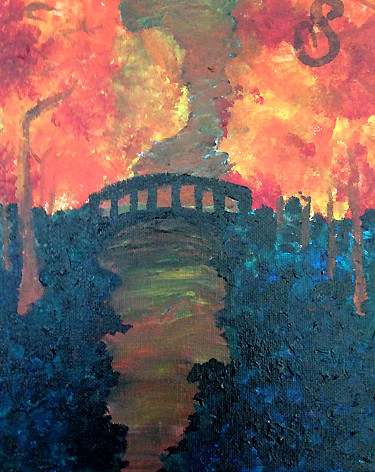
A Japanese bridge on a crisp Autumn day! Inviting!
